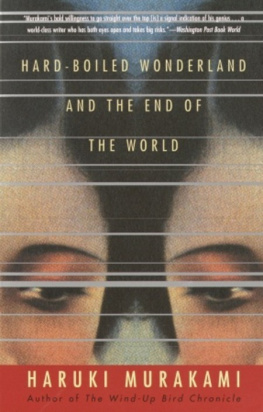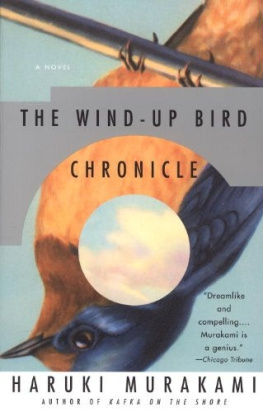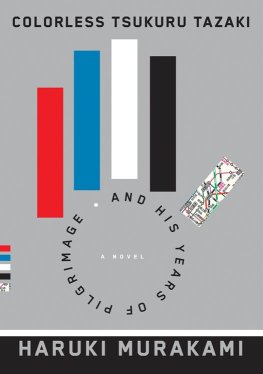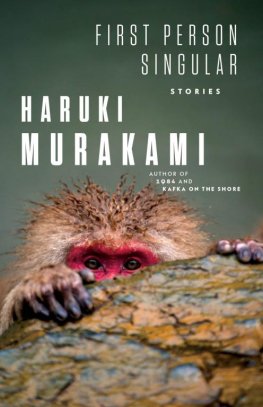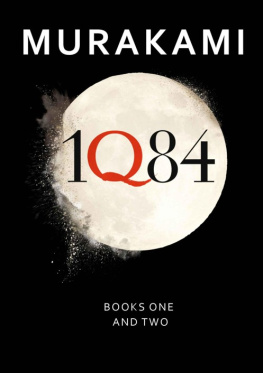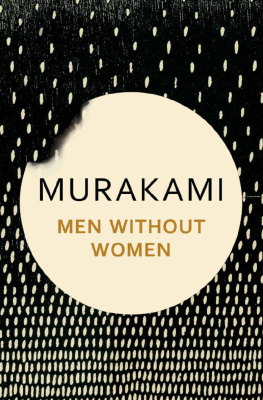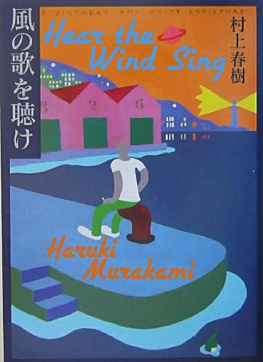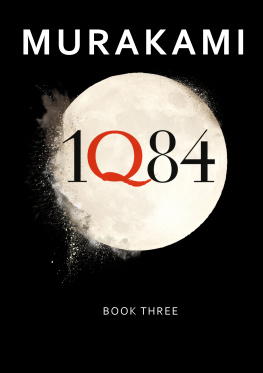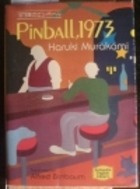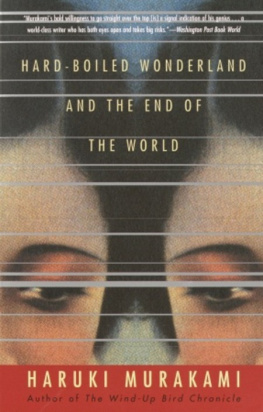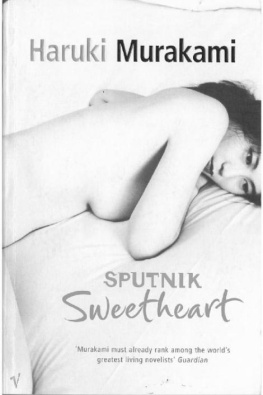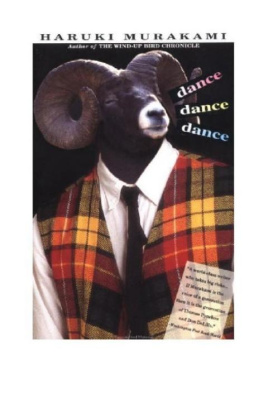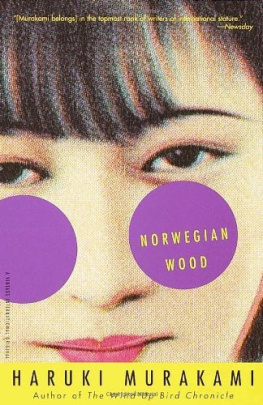Haruki Murakami - Hardboiled Wonderland and the End of the World
Here you can read online Haruki Murakami - Hardboiled Wonderland and the End of the World full text of the book (entire story) in english for free. Download pdf and epub, get meaning, cover and reviews about this ebook. genre: Science. Description of the work, (preface) as well as reviews are available. Best literature library LitArk.com created for fans of good reading and offers a wide selection of genres:
Romance novel
Science fiction
Adventure
Detective
Science
History
Home and family
Prose
Art
Politics
Computer
Non-fiction
Religion
Business
Children
Humor
Choose a favorite category and find really read worthwhile books. Enjoy immersion in the world of imagination, feel the emotions of the characters or learn something new for yourself, make an fascinating discovery.
- Book:Hardboiled Wonderland and the End of the World
- Author:
- Genre:
- Rating:3 / 5
- Favourites:Add to favourites
- Your mark:
- 60
- 1
- 2
- 3
- 4
- 5
Hardboiled Wonderland and the End of the World: summary, description and annotation
We offer to read an annotation, description, summary or preface (depends on what the author of the book "Hardboiled Wonderland and the End of the World" wrote himself). If you haven't found the necessary information about the book — write in the comments, we will try to find it.
Hardboiled Wonderland and the End of the World — read online for free the complete book (whole text) full work
Below is the text of the book, divided by pages. System saving the place of the last page read, allows you to conveniently read the book "Hardboiled Wonderland and the End of the World" online for free, without having to search again every time where you left off. Put a bookmark, and you can go to the page where you finished reading at any time.
Font size:
Interval:
Bookmark:
TRANSLATED FROM THE JAPANESE BY
Alfred Birnbaum
Haruki Murakami was born in Kyoto in 1949. He met his wife, Yoko, at university and they opened a jazz club in Tokyo called Peter Cat. The massive success of his novel Norwegian Wood (1987) made him a national celebrity. He fled Japan and did not return until 1995. His other books include after the quake, Dance Dance Dance, A Wild Sheep Chase, The Wind-up Bird Chronicle, Underground, his first work of non-fiction, Sputnik Sweetheart and South of the Border, West of the Sun. He has translated into Japanese the work of F. Scott Fitzgerald, Truman Capote, John Irving and Raymond Carver.
Alfred Birnbaum was born in Washington D.C. in 1957 and grew up in Tokyo. He is the translator of Dance Dance Dance and A Wild Sheep Chase. He has also translated works by Natsuki Ikezawa, Kyoji Kobayashi, Miyuki Miyabe, Tatsuhiko Shibusawa and Gen'ichiro Takahashi and compiled the anthology Monkey Brain Sushi: New Tastes in Japanese Fiction.
Also by Haruki Murakami
Fiction
Dance Dance Dance
The Elephant Vanishes
A Wild Sheep Chase
Norwegian Wood
The Wind-up Bird Chronicle
South of the Border, West of the Sun
Sputnik Sweetheart
after the quake
Non-Fiction
Underground: The Tokyo Gas Attack and the Japanese Psyche

THE elevator continued its impossibly slow ascent. Or at least I imagined it was ascent. There was no telling for sure: it was so slow that all sense of direction simply vanished. It could have been going down for all I knew, or maybe it wasn't moving at all. But let's just assume it was going up. Merely a guess. Maybe I'd gone up twelve stories, then down three. Maybe I'd circled the globe. How would I know?
Every last thing about this elevator was worlds apart from the cheap die-cut job in my apartment building, scarcely one notch up the evolutionary scale from a well bucket. You'd never believe the two pieces of machinery had the same name and the same purpose. The two were pushing the outer limits conceivable as elevators.
First of all, consider the space. This elevator was so spacious it could have served as an office. Put in a desk, add a cabinet and a locker, throw in a kitchenette, and you'd still have room to spare. You might even squeeze in three camels and a mid-range palm tree while you were at it. Second, there was the cleanliness. Antiseptic as a brand-new coffin. The walls and ceiling were absolutely spotless polished stainless steel, the floor immaculately carpeted in a handsome moss-green. Third, it was dead silent. There wasn't a soundliterally not one soundfrom the moment I stepped inside and the doors slid shut. Deep rivers run quiet.
Another thing, most of the gadgets an elevator is supposed to have were missing. Where, for example, was the panel with all the buttons and switches? No floor numbers to press, no door open and door close, no emergency stop. Nothing whatsoever. All of which made me feel utterly defenseless. And it wasn't just no buttons; it was no indication of advancing floor, no posted capacity or warning, not even a manufacturer's name-plate. Forget about trying to locate an emergency exit. Here I was, sealed in. No way this elevator could have gotten fire department approval. There are norms for elevators after all.
Staring at these four blank stainless-steel walls, I recalled one of Houdini's great escapes I'd seen in a movie. He's tied up in how many ropes and chains, stuffed into a big trunk, which is wound fast with another thick chain and sent hurtling, the whole lot, over Niagara Falls. Or maybe it was an icy dip in the Arctic Ocean. Given that I wasn't all tied up, I was doing okay; insofar as I wasn't clued in on the trick, Houdini was one up on me.
Talk about not clued in, I didn't even know if I was moving or standing still.
I ventured a cough, but it didn't echo anything like a cough. It seemed flat, like clay thrown against a slick concrete wall. I could hardly believe that dull thud issued from my own body. I tried coughing one more time. The result was the same. So much for coughing.
I stood in that hermetically sealed vault for what seemed an eternity. The doors showed no sign of ever opening. Stationary in unending silence, a still life: Man in Elevator.
I started to get nervous. What if the machinery had malfunctioned? Or suppose the elevator operatorassuming there was one in the buildingforgot I was here in this box? People have lost track of me before.
I strained to hear something, anything, but no sound reached my ears. I pressed my ear against the stainless-steel wall. Sure enough, not a sound. All I managed was to leave an outline of my ear on the cold metal. The elevator was made, apparently, of a miracle alloy that absorbed all noise. I tried whistling Danny Boy, but it came out like a dog wheezing with asthma.
There was little left to do but lean up against a wall and count the change in my pockets. For someone in my profession, knowing how to kill time is as important a method of training as gripping rubber balls is for a boxer. Although, in any strict sense, it's not killing time at all. For only through assiduous repetition is it possible to redistribute skewed tendencies.
I always come prepared with pockets full of loose change. In my right pocket I keep one-hundred- and five-hundred-yen coins, in my left fifties and tens. One-yen and five-yen coins I carry in a back pocket, but as a rule these don't enter into the count. What I do is thrust my hands simultaneously into both pockets, the right hand tallying the hundreds and five-hundreds in tandem with the left hand adding up the fifties and tens.
It's hard for those who've never attempted the procedure to grasp what it is to calculate this way, and admittedly it is tricky at first. The right brain and the left brain each keep separate tabs, which are then brought together like two halves of a split watermelon. No easy task until you get the hang of it.
Whether or not I really do put the right and left sides of my brain to separate accounts, I honestly can't say. A specialist in neurophysiology might have insights to offer on the matter. I'm no neurophysiologist, however. All I know is that when I'm actually in the midst of counting, I feel like I'm using the right side and left side of my brain differently. And when I'm through counting, it seems the fatigue that sets in is qualitatively quite distinct from what comes with normal counting. For convenience sake, I think of it as right-brain-totals-right-pocket, left-brain-totals-left-pocket.
On the whole, I think of myself as one of those people who take a convenience-sake view of prevailing world conditions, events, existence in general. Not that I'm such a blase, convenience-sake sort of guyalthough I do have tendencies in that directionbut because more often than not I've observed that convenient approximations bring you closest to comprehending the true nature of things.
For instance, supposing that the planet earth were not a sphere but a gigantic coffee table, how much difference in everyday life would that make? Granted, this is a pretty farfetched example; you can't rearrange facts of life so freely. Still, picturing the planet earth, for convenience sake, as a gigantic coffee table does in fact help clear away the clutterthose practically pointless contingencies such as gravity and the international dateline and the equator, those nagging details that arise from the spherical view. I mean, for a guy leading a perfectly ordinary existence, how many times in the course of a lifetime would the equator be a significant factor?
Font size:
Interval:
Bookmark:
Similar books «Hardboiled Wonderland and the End of the World»
Look at similar books to Hardboiled Wonderland and the End of the World. We have selected literature similar in name and meaning in the hope of providing readers with more options to find new, interesting, not yet read works.
Discussion, reviews of the book Hardboiled Wonderland and the End of the World and just readers' own opinions. Leave your comments, write what you think about the work, its meaning or the main characters. Specify what exactly you liked and what you didn't like, and why you think so.

